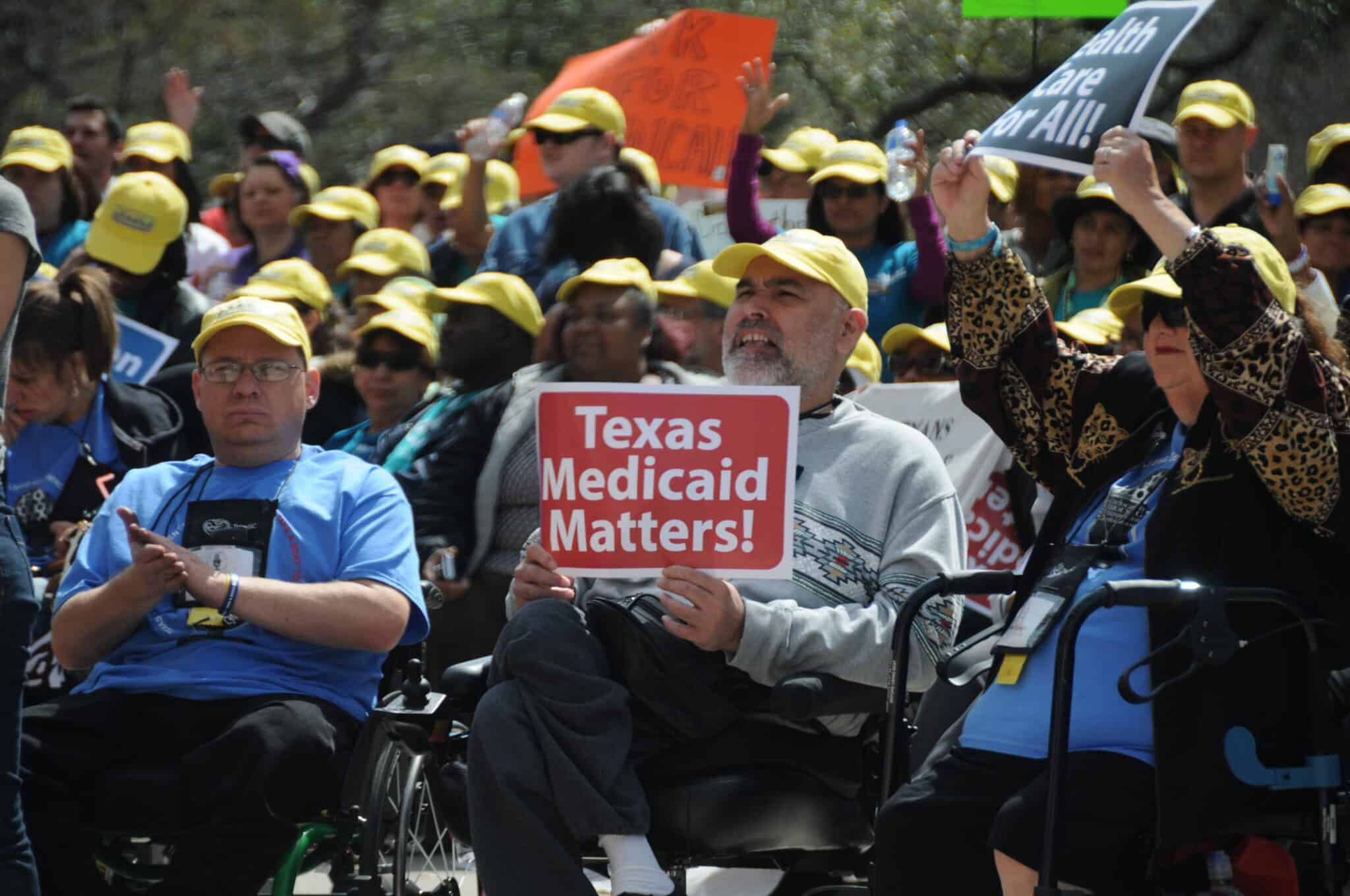
Andre Manuel is a student at Harvard Law School and a member of the Labor and Employment Lab.
The Biden Administration recently moved to remove work requirements from the Medicaid Program, ensuring that low-income Americans have health insurance whether or not they work. This welcome change is a recognition of the fact that work requirements unfairly punish people living in poverty and are out of sync with workers’ needs in the modern economy. But other important federal benefits that help low-income people purchase food, housing, and other necessities, continue to be tied to labor force participation. The ongoing Covid-19 pandemic exposes the cruelty of these policies; it’s time to end work requirements once and for all.
Nearly 80 million Americans receive health insurance through Medicaid, the federally-funded, state-managed health insurance program for low-income people. In 2018, the Trump Administration announced a policy shift allowing states to impose a work requirement for Medicaid; cutting off insurance to low-income people who didn’t work a sufficient number of hours each month. In states that were moving to implement work requirements, as many as 40% of Medicaid recipients faced loss of health insurance coverage. Amidst a legal challenge, President Biden recently moved to undo the Trump Administration’s policy.
The attempt to make Medicaid work-based was yet another cruel and vindictive Trump policy, made even more harmful by the Covid-19 pandemic. At a time where they needed healthcare most, millions of low-income Americans faced loss of coverage because they lost their jobs or because working became too dangerous. Though Biden’s shift is heartening, Medicaid is but the tip of the iceberg; work requirements are ubiquitous in American social policy.
Work Requirements and the Social Safety Net
The American social safety net is built on a paradox. You must be poor, but not too poor, to receive benefits. Nearly all of the need-based social programs — those available only to the neediest Americans, determined by income level — have some sort of work requirement built in. To participate in the Supplemental Nutrition Assistance Program (SNAP), often referred to as food stamps, able-bodied adults must meet a work requirement.
Two other major components of the social safety net have work requirements: Temporary Assistance for Needy Families (TANF), and the Earned Income Tax Credit (EITC). TANF, much like SNAP and Medicaid, is a federal program but is administered by the states meaning a great deal of variability in eligibility requirements. But since reform in the 1990s, nearly all states have adopted a welfare-to-work model, aimed less at supporting low-income families and more at pushing them into the labor market through work requirements. Similarly, the much–heralded Earned Income Tax Credit (EITC), the single largest pure cash transfer program in the US, is inherently work-based. The refundable tax credit is available only to people with income. The EITC’s famous “trapezoid” gradually phases in as workers’ income increases, and then gradually phases out until a worker’s income is too high to qualify. For instance, a single parent of two children begins receiving the credit with any income, receives the maximum credit at an income of around $15,000, and loses the EITC at a little under $50,000. The Trump Administration sought to introduce and strengthen work requirements across the federal social programs, even considering requiring public housing authorities to adopt work requirements.
Many view work requirements as a success because they incentivize work. They certainly have pushed many people out of social programs, though evidence on their effects increasing work is mixed; results from a new study in Stockton, California show that a universal benefits do not discourage work.
Against Work Requirements
Work requirements are as much of a stick as a carrot. They encourage workforce participation through penalizing nonwork, seemingly out of a desire to target aid only towards the “deserving poor.” Work requirements, though, have always distorted labor markets and low-income Americans’ life choices for the worse, in ways made even more apparent by Covid-19 and the ensuing economic crisis.
Work requirements are flawed in principle and in execution. Whether or not work requirements effectively incentivize work, their conception and goals are flawed for three reasons. First, work requirements punish the most economically vulnerable individuals and families. The non-working poor are already comparatively worse off than the working poor. Families without working adults already suffer from their lack of income; work requirements compound the hurt by cutting off their access to needed social programs as well.
Second, work requirements limit the ability of the social safety net to act as a countercyclical response to economic downturns. If transfers are tied to work, net government outflows necessarily decline with job losses, exacerbating economic losses and increasing the chance of recession. Certainly, Congress can act to fill that gap in a crisis, but gridlock and disfunction in Washington means that support may be delayed or too small. Social programs that become more, not less, generous as need increases can help effectively respond to crises.
Third, penalizing non-workers distorts the labor market by tilting an already uneven bargaining scale in employers’ favor. Employees are punished plenty for losing their jobs. Tying social programs to participation in the labor force incentivizes workers to stay in bad employment situations, and may even help drive wages down. Workers have far less flexibility to leave or bargain if they rely on their jobs not only for their wages but also for access to additional government benefits.
Work requirements are also flawed in implementation. The limited exceptions to work requirements cannot account for all the legitimate reasons people cannot or do not work. Work requirements punish those who do not work by making them ineligible for transfers that can help them attain basic necessities. But many people have perfectly good reasons not to work, especially presently. The Covid-19 economic slowdown has eliminated millions of jobs; many who might like to work are unable to because jobs simply are not available.
Aside from unemployment, many may have perfectly good reasons to leave their jobs or not to work at all. Many adults may choose to engage in childcare rather than work. Especially as many schools remain closed, workers who cannot complete their jobs remotely may have no choice but to stay home and take care of their children. But the pandemic merely exposes the ever-present cruelty of penalizing low-income people who chose to engage in childcare rather than work. Welfare reform’s addition of work requirements made it nearly impossible for many low-income single parents to stay home and take care of their children, increasing their participation in the workforce and dramatically decreasing their rate of welfare uptake.
Conclusion
The pandemic has renewed calls for a Universal Basic Income (UBI) and revived the debate over whether social programs should be means-tested. That is an important discussion, but a focus on whether people who are relatively better off should be able to participate in social programs ignores how our present safety net punishes those most in need. Work requirements frustrate the social safety net’s ability to fight abject poverty, and morph the labor market to disfavor low-income workers even more. Existing policy mechanisms have the capacity to better fight poverty and achieve economic justice, but work requirements frustrate those goals with a misguided emphasis on labor force participation.










Daily News & Commentary
Start your day with our roundup of the latest labor developments. See all
March 2
Block lays off over 4,000 workers; H-1B fee data is revealed.
March 1
The NLRB officially rescinds the Biden-era standard for determining joint-employer status; the DOL proposes a rule that would rescind the Biden-era standard for determining independent contractor status; and Walmart pays $100 million for deceiving delivery drivers regarding wages and tips.
February 27
The Ninth Circuit allows Trump to dismantle certain government unions based on national security concerns; and the DOL set to focus enforcement on firms with “outsized market power.”
February 26
Workplace AI regulations proposed in Michigan; en banc D.C. Circuit hears oral argument in CFPB case; white police officers sue Philadelphia over DEI policy.
February 25
OSHA workplace inspections significantly drop in 2025; the Court denies a petition for certiorari to review a Minnesota law banning mandatory anti-union meetings at work; and the Court declines two petitions to determine whether Air Force service members should receive backpay as a result of religious challenges to the now-revoked COVID-19 vaccine mandate.
February 24
In today’s news and commentary, the NLRB uses the Obama-era Browning-Ferris standard, a fired National Park ranger sues the Department of Interior and the National Park Service, the NLRB closes out Amazon’s labor dispute on Staten Island, and OIRA signals changes to the Biden-era independent contractor rule. The NLRB ruled that Browning-Ferris Industries jointly employed […]